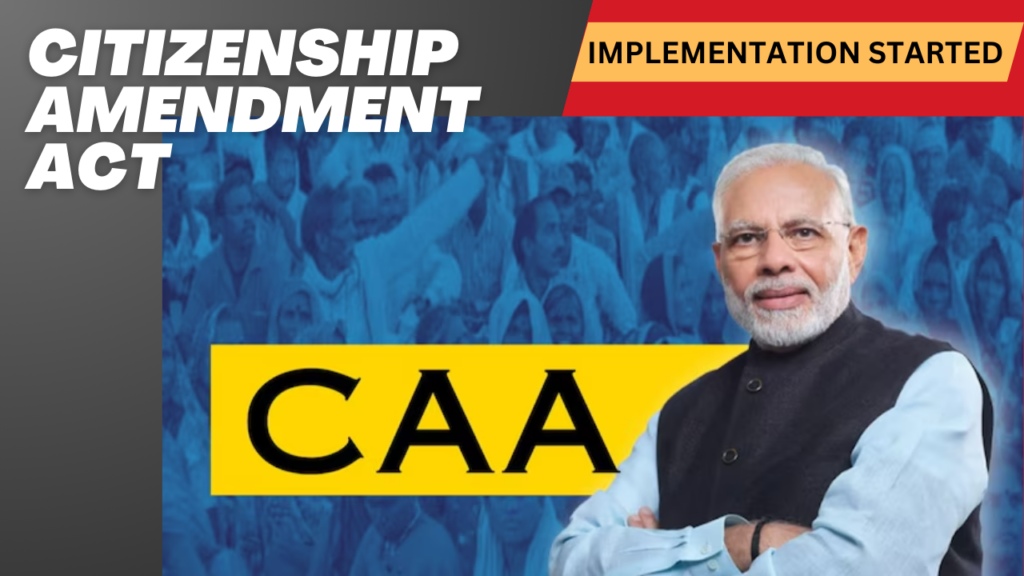Everyday Info – CAA Rules in India: CAA came into effect across the country ahead of the Lok Sabha polls.
India : CAA is now effective across the country. The Central Government of India has issued a notification this Monday about CAA before Lok Sabha Election 2024. Citizenship Amendment Act (CAA) applicable throughout the country after the notification released. CAA rules are effective from today. CAA application can be made from this Tuesday, 12/03/2024 i.e. tomorrow. The Ministry of Home Affairs of India has informed that the application for CAA should be made online through the portal.
Notification issued on CAA: Central Government’s big announcement ahead of Lok Sabha elections. The Citizenship Amendment Bill became law after being signed by the President on December 12, 2019. The whole country was in a frenzy. Then the CAA could not be implemented during the Corona phase that time. The Union Home Minister had earlier said that it would be effective before the Lok Sabha elections. This issue has also come up in the words of several Union Ministers. CAA comes into effect almost 4 and a half years after it became law.
Since 2014, Narendra Modi and Amit Shah have repeatedly come to Bengal and applied for citizenship. In the 2019 election manifesto, the BJP had announced the introduction of CAA. That same year, the Modi government passed the Citizenship Amendment Act or CAA, amending the Citizenship Act of 1955 for the second time in power. BJP claims there is a misconception about CAA. Among which, this law is for giving citizenship, no one’s citizenship will be taken away.

BJP’s argument is that with the introduction of CAA,
- Legal barriers to citizenship will be removed.
- Refugees can be given a dignified life.
- Protect the cultural, linguistic and social identity of the refugees.
- Refugees’ rights such as economic, commercial, free movement and purchase of property will be guaranteed.
Why is this law effective?
According to this law, if the religious minorities of Bangladesh, Pakistan and Afghanistan, i.e. Hindus, Buddhists, Jains, Sikhs, Parsis, Christians want to take refuge in India due to religious persecution, India will give them citizenship.
Who can apply?
Those who sought asylum before December 31, 2014 and have lived in India for 5 years will be eligible to apply for citizenship.
According to sources, all the rules and regulations will be issued on the official website of the Ministry of Home Affairs by tonight. The government will also issue a statement in this regard at a later date. Union Home Minister Amit Shah and BJP leaders have repeatedly said that they will implement the CAA before the Lok Sabha elections. CAA can be implemented only after the CAA notification is issued.
The Citizenship Amendment Act (CAA) has, however, caused a lot of controversy before. On that occasion, confusion about the correct information also spread. But do you know what the CAA or Citizenship Amendment Act actually is? What can happen to you and me?
How much impact will the Citizenship Amendment Act or CAA have on Indian citizens? According to the Ministry of Home Affairs, CAA or Citizenship Amendment Act has nothing to do with Indian citizens.
The fundamental rights of the citizens of this country are mentioned in the Indian constitution. Neither the CAA nor any related law can take away that right. Even Indian citizens, including Muslims, will not be affected by the CAA.

Who will this CAA apply to?
The Citizenship Amendment Act is for Hindu, Sikh, Jain, Buddhist, Parsi and Christian refugees expelled from Pakistan, Bangladesh and Afghanistan on religious grounds after 31 December 2014. The CAA will not apply to any other foreign refugees, including Muslims, from those three countries or any other country.
How will Hindus, Sikhs, Jains, Buddhists, Parsis and Christians from those three countries benefit from CAA?
One can apply for Indian citizenship even without documents like passport or visa. These refugees will get such an opportunity through the CAA. Secondly, their application for Indian citizenship will be smoother. The minimum period of residence in this country will be 1+5 years instead of 1+11 years.
Will the Muslims who came to this country and live illegally from these countries be deported?
Not at all. CAA has nothing to do with deportation of any citizen. This decision is taken according to the Foreigners Act of 1946 and the Passport Act of 1920. Decisions regarding entry and exit of foreign nationals into India are taken on the basis of these two Acts. Not on the basis of a person’s religion or country. These two laws apply to any foreigner residing illegally in India.
Can Hindus who are persecuted for religious reasons in those 3 countries apply for CAA?
No They have to apply in the same way as foreign nationals of other religions. Even with the CAA, as per the Citizenship Act, 1955, they will not get any additional benefits.
After CAA there will be NRC and citizenship will be given to all refugees except Muslims. And will Muslims be sent to detention camps?
CAA has nothing to do with NRC. The NRC has been legally integrated with the Citizenship Act of 1955 since December 2004. And only on the basis of certain rules of 2003, this Act is effective. It deals with the registration process of Indian citizens and issues related to national identity cards. This law has been in place for the past 15-16 years. The CAA has not changed this apart.
See More – Abortion is a constitutional right of women, this breakthrough decision made history

One thought on “CAA Rules in India – ahead of the LokSabha polls”